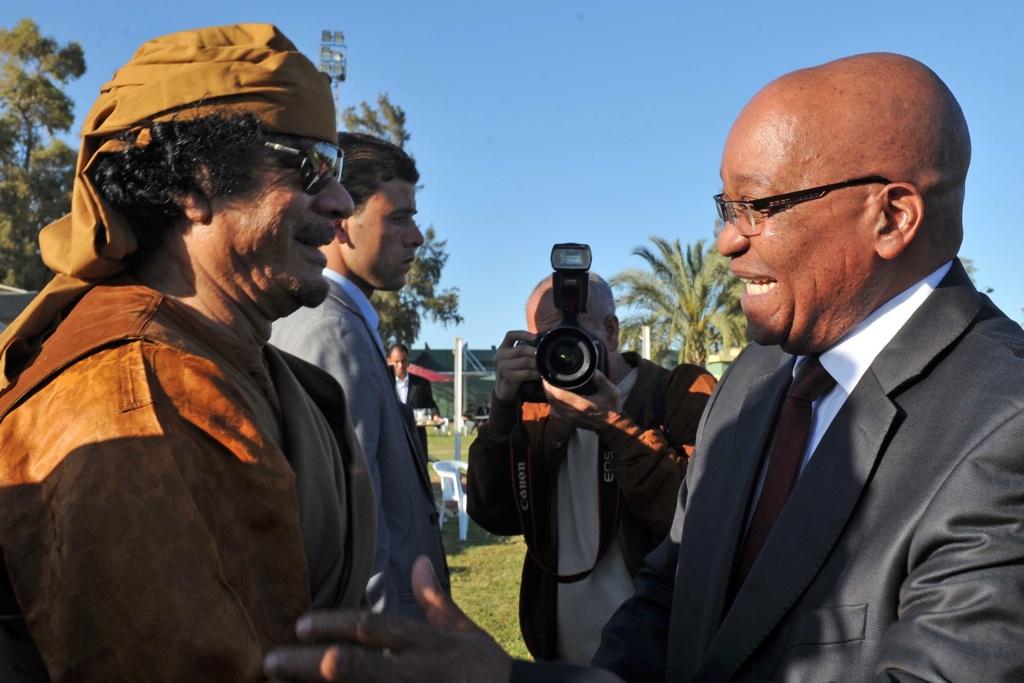Libya: Africa sticks by old friend Gaddafi
South Africa and the African Union have remained loyal to longtime friend and ally, the Libyan leader Muammar Gaddafi. Here South African President Jacob Zuma shakes hands with Gaddafi on his arrival in Tripoli, Libya on April 10, 2011.
JOHANNESBURG, South Africa — Call it an epic diplomatic fail by Africa’s biggest political leaders.
During the mounting violence of Libya’s revolution, South African President Jacob Zuma twice travelled to Tripoli to talk ceasefire with Muammar Gaddafi on behalf of the African Union. Both times Zuma came away praising the success of the summits and touting Gaddafi’s willingness to follow the AU’s roadmap to peace.
Only problem was that the rebel leaders swiftly rejected the African Union plan because it did not require Gaddafi to leave power.
More from Libya:
Now, even with rebels in control of most of Tripoli and major countries including the U.S. and U.K. recognizing the rebels’ transitional authority as Libya’s legitimate government, South Africa remains blithely set on its diplomatic path.
On Monday, as Tripoli fell, South African foreign minister Maite Nkoana-Mashabane stubbornly insisted to reporters that the African Union “roadmap” remains intact, and a change in Libyan government should happen through negotiations not force.
“The way forward should include the drafting of a new constitution leading to the first ever democratic elections,” she said at a news briefing in Johannesburg, still pushing the African Union plan.
"As far as we are concerned, if this government falls, there is no government,” she said.
Nkoana-Mashabane was forced to repeatedly deny rumors that South Africa had sent aircraft to help Gaddafi escape to South Africa, or possibly Angola or Zimbabwe, saying she was “amazed” by the insinuation.
Gaddafi’s whereabouts are unknown, and rumors persist that he will seek exile in southern Africa, with Al Jazeera reporting Monday that South Africa had brokered a deal for him to travel to Angola or Zimbabwe, which is already host to a former dictator, Ethiopia’s Mengistu Haile Mariam.
The state-owned South African Broadcasting Corporation reported that Angola has offered Gaddafi asylum.
South Africa’s response to the Libyan conflict has echoed its bumbling diplomatic efforts with Zimbabwe and other countries, including most recently the Ivory Coast: It emphasizes an “inclusive” solution, even if it props up a repressive regime.
Gaddafi remains popular among some members of South Africa’s ruling African National Congress party because of his support for the ANC during the apartheid era. Starting in the 1970s, the ANC used Libya as military training base for its cadres in the fight against apartheid.
Both Zuma and Nelson Mandela have fondly referred to Gaddafi as “Brother Leader.”
More from Libya: Libyans celebrate as rebels take Tripoli (photos)
While South Africa, which has a non-permanent seat on the United Nations Security Council, voted for the resolution authorizing the use of force in Libya to protect civilians, it quickly backtracked on its position.
Zuma, in a hasty about face, joined other African leaders in strongly condemning NATO’s airstrikes on Libya and calling for an end to the bombing campaign.
"We also join the continent and all peace-loving people of the world in condemning the continuing aerial bombardments of Libya by Western forces," the ANC executive said, echoing the African Union’s position.
Gaddafi, spurned by many Arab leaders, had insisted that any initiative to resolve his country’s crisis would have to go through the African Union, highlighting that Libya is an “African country.”
More from Libya: NATO sees its role in Libya coming to an end
The African Union, headquartered in Addis Ababa, Ethiopia, has been a vehicle for Gaddafi to build influence on the continent, backed by Libya’s oil money. Gaddafi was the driving force to transform the continental group from the Organization of African Unity to the African Union in 2002. And he has regularly bankrolled the organization when other members fail to pay their dues. As a result the African Union is in his debt.
On Monday the AU’s Peace and Security Council held a meeting on the Libya conflict. But despite the rapidly evolving situation in Tripoli and clear signs that Gaddafi’s end as ruler is near, the AU decided to delay any decisions until another session due later in the week.
South Africa will participate in high-level African Union meetings Thursday to "review the situation in Libya."
In other words, as a result of their close ties with the Gaddafi government, neither South Africa nor the African Union will budge from their support of Gaddafi's crumbling regime.
Every day, reporters and producers at The World are hard at work bringing you human-centered news from across the globe. But we can’t do it without you. We need your support to ensure we can continue this work for another year.
Make a gift today, and you’ll help us unlock a matching gift of $67,000!
